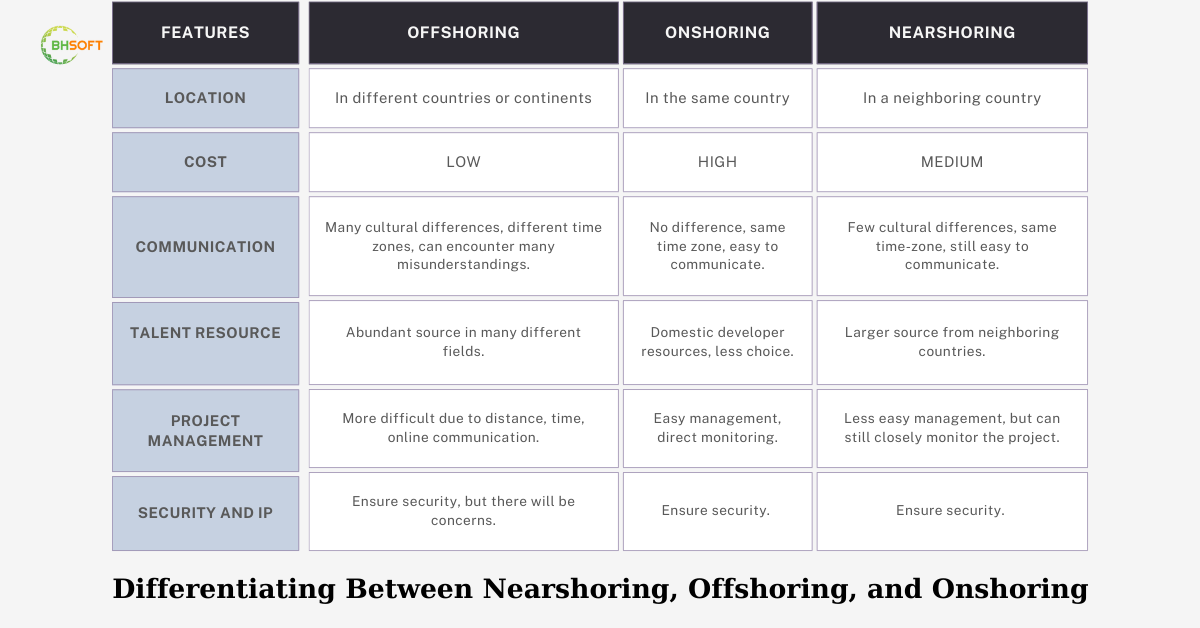The Top 7 Advantages of Nearshoring: Is It Right For You?
5 minutes read
Audio description available
October 22, 2024
You want your business to grow quickly but still save costs? But did you know that the current human resources are in short supply? According to a survey by Garner, 73% of CIOs are concerned about the lack of IT talent. Currently, most companies solve this problem by nearshoring, a model of outsourcing. This trend is gradually becoming popular because it not only expands the size of the company's team but also cuts costs and recruitment processes for them.
This article aims to clarify what nearshoring is, distinguishing it from some other outsourcing models. In particular, we will specifically analyze the key advantages of nearshoring, helping you decide whether to choose it for your business or not.

What is nearshoring? How is it different from offshoring and onshoring?
Nearshoring is a model of outsourcing in which the outsourcing company you hire is located close enough to your country, typically on the same continent. For instance, your US-based company works with a software outsourcing company in Mexico to increase chances of finding skilled workers who can support the expansion of your business and to benefit from lower hourly rates than in the US.
Nearshoring follows the principles of business outsourcing but focuses on hiring professionals from a nearby country to work remotely. Nearshoring is a good option for businesses that wish to reduce expenses by outsourcing to regions with cheaper labor costs but want to avoid dealing with time zones or cultural differences. Compared to offshore outsourcing or onshoring outsourcing, this is still the easiest and most profitable path for most businesses.
Differentiating Between Nearshoring, Offshoring, and Onshoring
- Offshoring occurs when your company and the offshore development center are located on different continents. Typically, offshore outsourcing involves countries with lower-cost economies. Therefore, it can be the cheapest software outsourcing solution, but it has some disadvantages, such as cultural differences, time zone differences, and communication difficulties.
- Onshoring means that the company and the outsourcing development team are based in the same country (for example, a US business outsources software development to Silicon Valley or another city like San Francisco). This model does not have cultural differences, time zone differences, or communication difficulties. So you have excellent control over the project team when you use this model. But, in comparison to other models, you will pay more and have fewer options for a more varied pool of human resources.
- Nearshoring is when a development team is located in a neighboring country or on the same continent. This model offers a balance between the proximity of onshore and the cost savings of offshore.
To help you better understand the differences between these three software outsourcing models, we have put together information about them. Follow the illustration image below.
Read more: Replacement vs Modernization Legacy Systems: Which Is The Right Path For Your Business?
.png)
Top 7 Advantages of Nearshoring
By the end of 2024, Statista projects that the global market for IT outsourcing will have grown to $512.5 billion. More than 75% of executives say they will outsource IT services. This data highlights the growing trend of outsourcing, leading to the rising popularity of nearshoring. Nearshoring is becoming more and more popular, which emphasizes the advantages it offers to actual projects. Here are the key advantages of nearshoring:
1. Proximity
Collaborating with neighboring countries allows for similar time zones, simplifying communication. One of the common issues with outsourcing is dealing with time zone differences. Unless your company requires 24/7 operations, coordinating with a team on the other side of the globe can result in miscommunication and delays. Aligning work hours with your remote team minimizes these challenges.
Another benefit of close proximity is the ease of travel if face-to-face meetings are necessary. Shorter distances mean minimal jet lag and lower travel expenses.
2. Lower costs
One of the key advantages of nearshoring is cost efficiency. Zippia reports that 59% of businesses cite cost savings as the primary reason for outsourcing (also nearshoring). With nearshoring, you save money compared to local hiring, though costs might be higher than offshoring. By shifting some of your operations to a nearby country, a company can save on labor costs, taxes, and overhead expenses. According to Forbes, companies can save up to 70% of operating costs by outsourcing IT services.
3. Skilled workers
Nearshoring helps address talent shortages by giving companies access to a larger pool of skilled professionals in nearby locations. Some countries are known for having specialized talent in specific industries, allowing you to find experts that match your needs. In fact, 26% of small businesses use nearshoring as a way to get professional assistance with specialized tasks or business technology consulting.
4. Faster delivery
Short distances speed up shipping and service delivery times. If the outsourcing country is close to the home country, the process can be monitored and managed more easily. As a result, companies can quickly adjust their outsourcing strategies to meet their evolving needs.
5. Improved control
Being closer makes it easier to monitor work quality. When you outsource to a different country, you may lose control over your business operations, especially if you're unfamiliar with the language or culture of the outsourced staff. By working with nearby talent who understand your needs and can communicate effectively, nearshoring allows you to maintain control over your project and gain a competitive advantage.
6. Flexibility
Compared to other outsourcing strategies, nearshoring offers greater flexibility. When you need to make last-minute changes or address urgent issues, a nearby partner can respond quickly due to minimal time zone differences. This ability to react promptly ensures that your project stays on track and meets deadlines more efficiently.
7. Similar culture
Due to the geographical proximity, cultural differences are minimal or even negligible. There won’t be misunderstandings between colleagues caused by language or cultural barriers. As a result, teams can work smoothly together, communication happens faster, and exchanges are more effective, leading to improved efficiency and higher-quality outcomes.
.png)
The Downsides Of Nearshoring
Notwithstanding its advantages, nearshoring has certain drawbacks that you should be aware of. With over 10 years of experience as a nearshoring partner, we have summarized the key challenges as follows:
Choosing the right partner
Finding the right partner in a new market can be challenging, including negotiating new management systems and avoiding legal issues or penalties for non-compliance.
Quality concerns
While nearshoring can save costs, if the chosen outsourcing country doesn’t have the same quality standards, this can affect the outcome. Therefore, ensuring quality remains a major concern.
Political and economic stability
Another challenge is dealing with political and economic instability in the outsourcing location. Your outsourcing process may be interrupted if the nation experiences crises or abrupt changes in government policy.
Legal and regulatory challenges
Every nation has its own laws, some of which are complex at times. You must ensure that your business complies with all local laws, much like learning the rules of a house before visiting a friend's home.
Final thoughts
In summary, nearshoring clearly offers numerous advantages for your business. By leveraging the key advantages of nearshoring, you can reduce operating costs and increase opportunities to find talented professionals who can help your business grow. Keep in mind that choosing the right service provider is crucial to ensuring your business's success.
You don’t have to search for the ideal nearshore partner on your own—BHSoft can help you fill your vacancies with a dedicated development team from a leading software company in Vietnam. Our team has firsthand experience with the real advantages of nearshoring in various ways for our clients. As a result, we take great pride in having the knowledge and experience to enable your company to fully benefit from them.
Contact us to unlock the full potential advantages of nearshoring for your business.

